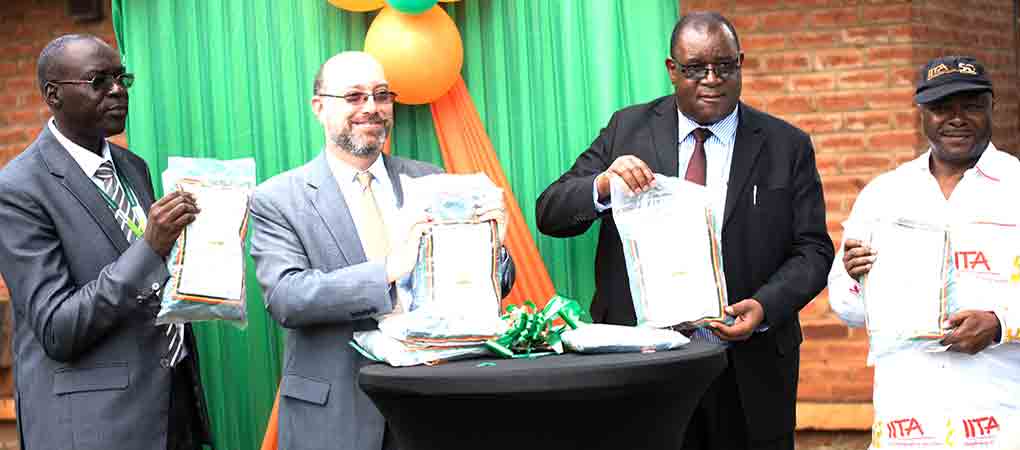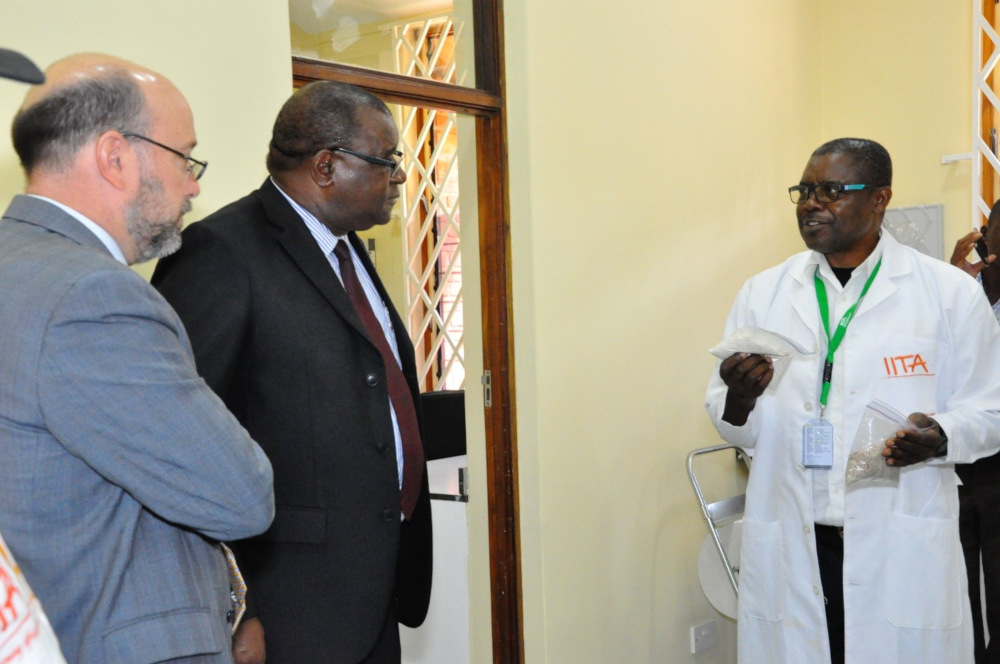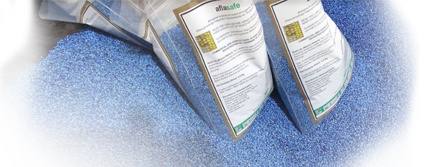Aflasafe MWMZ01 and Aflasafe MW02 have been launched in Malawi and are off to a flying start, with powerful supporters, eager partners and improved infrastructure beside them in the fight against aflatoxin. The launch, on 10th April 2019 in Lilongwe, was part of a joyful celebration of the first fruits of a major collaboration for aflatoxin control with investment from the US Government. Our twin Aflasafe products enter the world alongside a brilliant elder sibling, with the handover of the Aflatoxin Research and Testing Laboratory to the Government of Malawi.

Aflatoxin is locking Malawi out of lucrative export markets. Billions of kwacha – millions of dollars – are lost to Malawi every year. Yet with effective aflatoxin control, groundnut exports alone could grow tenfold, and account for an impressive 10% of the country’s current exports. So, the ground is fertile, and Aflasafe ready for full commercialisation in Malawi, which now requires private-sector leadership and expertise.
“As all of those present understand, high aflatoxin levels in Malawi’s maize and groundnuts harm Malawians’ health and reduce important export and trade opportunities” said Mr Andrew Herrup, Deputy Chief of Mission to the US Embassy in Malawi, in his address at the launch and handover. He went on to explain the health damage caused by aflatoxin, including liver cancer, weakened immunity, and stunted growth and development in babies and children.
“But there is an important economic side as well. Malawi’s farmers are blessed with the soil and climate conducive to the production of groundnuts. The worldwide trade in groundnuts exceeds 2.94 billion US dollars, and is growing at 5 percent a year. Malawi cannot fully participate in this growth, because premium export markets will not accept products tainted with aflatoxins,” said Mr Herrup.
The Honourable Minister for Agriculture, Irrigation and Water Development, Hon Joseph Mwanamvekha, was represented at the event by Dr Alexander Bulirani, Controller of Agricultural Services. He noted that aflatoxin is strictly monitored by both domestic and international premium markets. For these markets, crops with aflatoxin above safety limits are a health hazard, and so have zero or greatly reduced commercial value, and should be destroyed.
“An African Union report suggests that Malawi is losing about MWK 64.1 billion in trade annually due to the presence of aflatoxins in Malawi’s groundnuts. That’s 10 times Malawi’s current groundnut exports and equivalent to 10 percent of total Malawi exports,” observed Mr Herrup. “The US Government thinks this is unacceptable, and that is why we’ve teamed up with the International Institute of Tropical Agriculture (IITA) and the Government of Malawi to address the aflatoxin problem head-on.”
The bumper anti-aflatoxin harvest being celebrated in April was nurtured through the Feed the Future Malawi Improved Seed Systems and Technologies (MISST) project. MISST was funded by the United States Agency for International Development (USAID), with more than MWK 1.5 billion (USD 2 million) earmarked for fighting aflatoxin. It brought together the Malawi Department of Agricultural Research Services (DARS), the Agricultural Research Service of the United States Department of Agriculture (USDA–ARS), IITA, and several other partners.

This harvest comprises three fine fruits. Firstly, the Aflatoxin Research and Testing Laboratory at DARS’ Chitedze Agricultural Research Station means Malawi has one of the few laboratories in the region with the capacity to comprehensively test for aflatoxin. Researchers will be able to effectively monitor and map contamination, and demonstrate the effectiveness of Aflasafe and other solutions.
Secondly, MISST facilitated the development, led by IITA, of Aflasafe MWMZ01 and Aflasafe MW02 – tailormade, natural Aflasafe products for Malawi that use friendly local fungi to slash aflatoxin contamination from the plot to the plate. Aflasafe is an incredibly effective solution: in tests on the ground in farmers’ fields, both Aflasafe MWMZ01 and Aflasafe MW02 consistently cut the amount of aflatoxin in maize and groundnut by at least 90%. In nearly all cases, this brought aflatoxin levels down to under 4 parts per billion – the strict European Union safety limit – opening the door to a large and lucrative potential export market.
Thirdly, the MISST collaboration actively trained and built the capacity of laboratory and research professionals in Malawi, who will be leading the charge in the future fight against aflatoxin – and what a future it is set to be!
Based on the outstanding trial results, in December 2018 Malawi’s Agricultural Technical Clearing Committee approved Aflasafe MWMZ01 and Aflasafe MW02 for release and use by farmers. The next step towards sustainable commercialisation is to officially register the new Aflasafe products with the Pesticides Control Board. It will then be important to engage private-sector manufacturing and distribution partners to make the product available, and to create awareness of aflatoxins and Aflasafe. “We need to make the message on the health aspect for people to understand that they are consuming highly contaminated maize and groundnut, which endangers their lives,” said Dr Bulirani.
Ultimately, Aflasafe offers Malawi the means to meet the demands of the most stringent and rewarding export markets, and turn lost business opportunities into billions of kwacha earnt each year, as well as protecting its citizens from dangerous health risks. Meanwhile, Aflasafe also offers a commercial opportunity for private-sector partners with vision.
“Experience throughout Africa, where Aflasafe has been commercialised, shows that we need the private sector to take Aflasafe from an effective technology in field tests to a viable, commercially-oriented product used by millions of farmers,” said Mr Herrup. “We can do this. The partners gathered here today understand the importance of Aflasafe to Malawi’s future. Private investors here today recognise the investment potential of Aflasafe and are ready to partner with the Government of Malawi to make this happen.”
LINKS
- US Embassy in Malawi: U.S. and Malawi team up to reduce aflatoxins in maize and groundnut
- IFPRI: Addressing aflatoxin contamination and improving food safety in Malawi
- IITA News: DG Sanginga graces handover of aflatoxin laboratory and launch of Aflasafe in Malawi
- Media coverage:
- The Nation: Annual aflatoxin losses pegged at K64bn
- Kulinji.com: US aids Malawi in reducing aflatoxins in maize, nuts
- Keep up with the latest on Aflasafe in Malawi and across Africa










